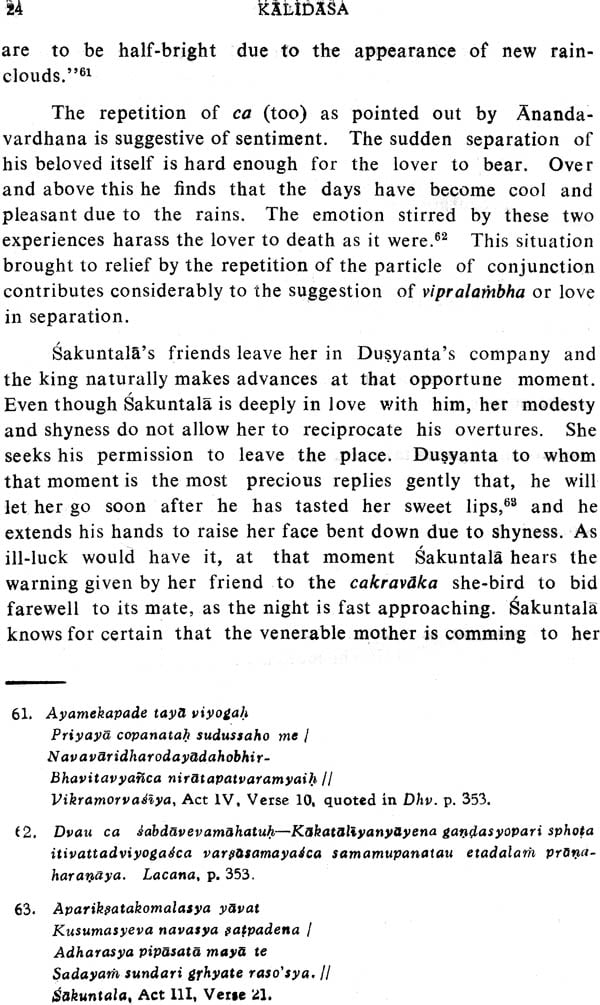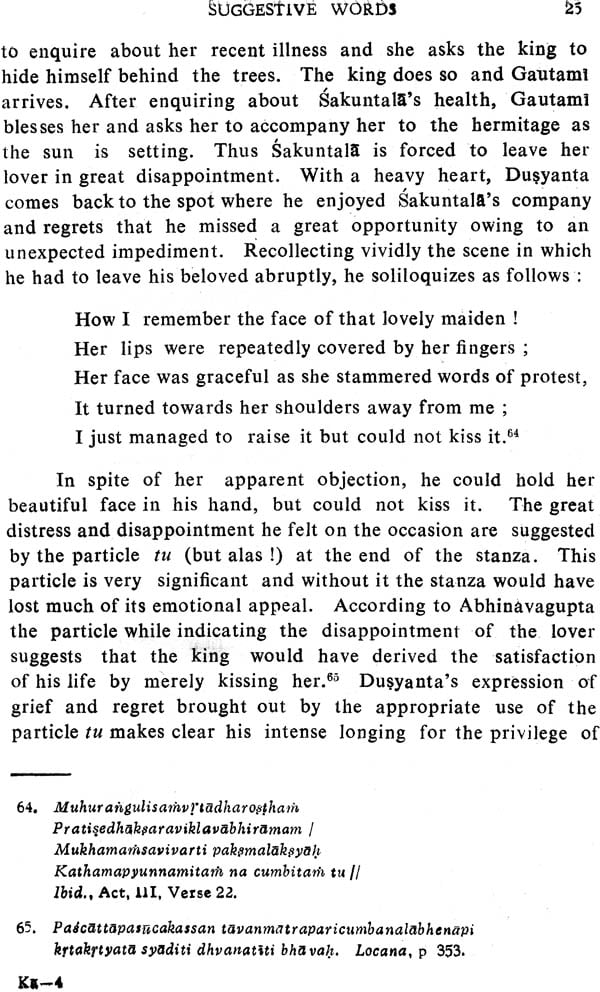
Kalidasa: An Assessment by Anandavardhana (An Old and Rare Book)
Book Specification
| Item Code: | NAK499 |
| Author: | Dr. P.K. Narayana Pillai |
| Publisher: | Vishveshvaranand Vedic Research Institute, Hoshiarpur |
| Language: | English |
| Edition: | 1974 |
| Pages: | 72 |
| Cover: | Hardcover |
| Other Details | 8.5 inch X 5.5 inch |
| Weight | 210 gm |
Book Description
As Professor of Sanskrit in the University College, Trivandrum, I was teaching, among other subjects, the theory of Dhvani to post-graduate students. In the course of the teaching work I undertook studies on various aspects of the subject and this monograph is the result of one of such studies. The importance Anandavardhana gave to Kalidasa in illustrating the Dhvani in all its details struck me and I was naturally led to reconstruct the total reaction of the greatest of Indian rhetoricians to the muse of the greatest of Indian poets. In fact, I experienced some sort of a thrill in putting myself in the shoes of Anandavardhana and envisaging the possible direct assessment he would have made of Kalidasa, on the basis of the materials culled from Dhvanyaloka. This interesting exercise ultimately suggested to me that in propounding his new poetic theory and in setting standards of aesthetic criticism, Anandavardhana derived more inspiration from Kalidasa than from any other poet.
The present Study was originally published in the twenty-fifth volume of the Bulletin of the Deccan College Research Institute, my alma mater. I recall with gratitude that my work came up for appreciation at the hands of many scholars including Dr. T. Burrow and Prof. K. A. Subramonia Iyer. While the former felt that "the collection of Anandavardhana's criticism of Kulidasa is very useful", the latter found that the "study brings out very clearly that Anandavardhana has managed in his Dhvanyaloha not only to put forward the most original theory of poetics, but also to do some literary criticism as far as Kalidasa is concerned."
It is really gratifying to me that Dr. Vishva Bandhu Shastri has thought it desirable to issue the work in a separate book-form and make it available to a wider circle of scholars interested in the field. For this act of kindness I am deeply indebted to him. I also put on record my deep gratitude and affection to my cousin Shri E. G. Trivikraman Pillai, a well- known linguist, for going through the original manuscript and making valuable suggestions.
Rhetoricians in Sanskrit, as a rule, do not directly subject any poet to their critical study as their main interest consists in formulating and expounding poetic theories. Anandavardhana, probably the most original and outstanding critic in Sanskrit literature, is no exception to this rule. His contribution to literary criticism, as is well known, is the theory of Dhvani or suggestion in poetry which he has enunciated and expounded with great thoroughness in his immortal work Dhvanyaloka, In the course of expounding the theory, for the purpose of illustration, he has profusely drawn upon the works of many eminent poets like Kalidasa. The passages which he has cited could not have been mechanically extracted from their sources as and when the necessity for various types of illustrations was felt. It will only be reasonable to presume that they got stuck to the critic's memory as the best specimens of poetry which impressed him in the course of his leisurely study of different authors. He has not only cited passages from Kalidasa's works with aesthetic appreciation and critical comments but has also made some interesting observations of a general character regarding the poet a nd his works. On the basis of this material of a sizable nature, an attempt is made in this Monograph to reconstruct the aesthetic reaction of the critic to Kalidasa's poetry. In other words, it is attempted here to envisage with the available material, how Anandavardhana would have appreciated Kalidasa had the critic been focusing his mind on the poet instead of the theory of suggestion. While Anandavardhana's appreciation of Kalidasa appears only in an indirect form in the context of his exposition of the Dhvani theory, the present study seeks to present it in direct relation to the poet.
| Woolner Indological Series: Its Dedication | vii | |
| Preface | xiii | |
| 1 | Introduction | 1 |
| 2 | General estimate | 1 |
| 3 | Beauty of Suggestion | 4 |
| 4 | Depiotion of conflieting moods | 9 |
| 5 | Inanimate objects and Sentiment | 12 |
| 6 | Figures and Sentiment | 15 |
| 7 | Suggesive Words | 21 |
| 8 | Subordinated Suggestion | 27 |
| 9 | Adaptation of Stories | 30 |
| 10 | Original element in the Plot | 42 |
| 11 | Variety in Desoription | 44 |
| 12 | Poetic Properiety and Genius | 52 |
| 13 | Conclusion | 53 |







